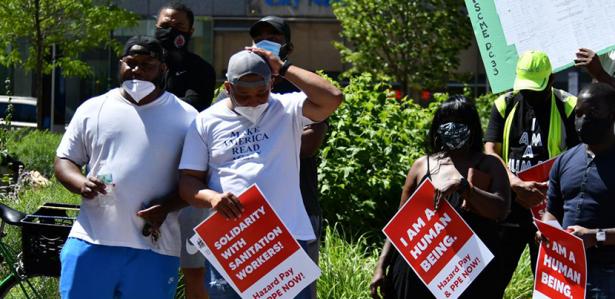While the job market continues to rebound, the public sector’s slower recovery is creating a roadblock for Black employment.
In February, employers added 678,000 jobs, with the federal, state and local governments filing 24,000 new positions. But the number of state and local government jobs is still 695,000 positions short of its pre-pandemic level in February 2020. With nearly 1-in-5 Black workers in public sector and government jobs, that lag weighs on the Black unemployment rate, which last month stood at 6.6%, or double the white unemployment rate.
The reduction in government jobs during the pandemic continues a long-tailed trend in the public sector, according to experts, and could lead to the widening of the racial wealth gap in the country if left unaddressed.
“When you see cuts to the public sector, that’s a cut that will disproportionately affect the Black community,” Kyle Moore, an economist with the Economic Policy Institute, told Yahoo Money. “Wealth is so porous in the Black community, so those that do have wealth have to be called upon to support the community. Because there are so few safety nets, that contributes to the wealth gap.”
Public sector job loss started with Great Recession
The Economic Policy Institute noted that the pandemic has caused a decrease of 1.4 million public sector jobs from February 2020 to February 2021. At the start of the COVID crisis in June 2020, 50% of public sector jobs in education and more than 1 in 10 education jobs were lost in 17 states.
That created a great loss of public sector jobs for Black workers, especially Black women. As of 2019, 48% of Black women were employed in education or other public service jobs.
Even though public sector job loss for Black workers has increased now, there is a precedent for the slowdown in public sector job growth overall. Professor Christian Weller from the University of Massachusetts, Boston told Yahoo Money that the decline started since the Great Recession. During that time, Black public sector workers were more likely to be unemployed and the Black/White wealth gap for women increased sixfold.
Weller wrote about the importance of public sector jobs to Black workers in a Center for American Progress report. He noted that public sector jobs were part of the government’s anti-discrimination efforts to bring more opportunities to Black workers starting in the 1960s.
“Public sector policies have gradually removed barriers to hiring and advancing Black workers. Public sector employment has posed fewer barriers for Black workers than is the case in the private sector,” Weller said.
Black workers gained access to middle-class with public sector jobs
Moore added that public sector jobs like ones in the post office were a “consistent pathway to the middle class for many Black workers because it gave equal employment opportunities”.
The public sector is also more likely to be unionized, Weller noted, helping Black workers better save for their futures and build wealth. Unions also create transparent hiring and promotion procedures that benefit all workers.
“Job stability allows people to take a longer view of their financial future and improves their savings. Decent wages help people pay their bills and save for the future. Benefits reduce costs and provide retirement savings, both of which can help improve overall wealth,” Weller said “We find that Black workers especially benefit from unionized public sector employment in terms of having more wealth relative to their private sector counterparts.”
How can public sector jobs return for Black workers?
Moore believes public sector jobs will eventually return as long as the economy continues to recover.
“So long as we manage to contain the virus, there are no new variants, and workers have the protections they need to work safely, the labor market should continue to improve,” said Moore.
“As workers find more stable employment, tax revenues should increase, meaning there will be more capacity to expand the public sector. Whether and to what extent that expansion happens depends on state and local policy priorities. But yes, there is the potential for growth in the public sector,” added Moore, who also advocates for better wages, unions, and access to personal protective equipment during the pandemic.
Federal funds from the American Rescue Plan can also help make up for losses in tax revenue and hire more workers, but that isn’t a long-term solution to help Black public sector workers, Weller said.
“They can use stimulus money, but that is a temporary fix,” Weller said. “State and local governments will need to consider which revenue sources they can access to make more investments in necessary services.”
A longer-term solution, though, is still needed.
“The public sector can establish private-public partnerships with HBCUs and minority-serving institutions as well as businesses in communities of color to boost wealth and employment there,” said Weller.
Ella Vincent is the personal finance reporter for Yahoo Money. Follow her on Twitter @bookgirlchicago.


Spread the word